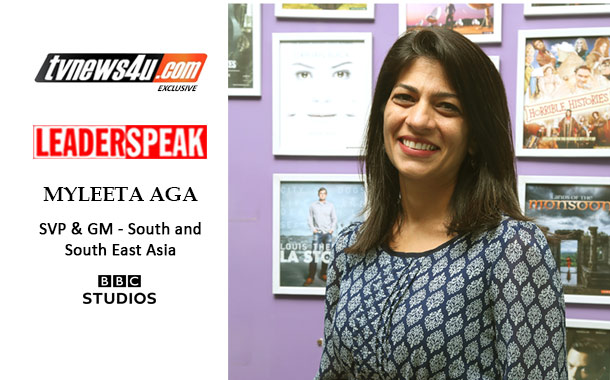By Yohan P Chawla
Myleeta Aga, Senior Vice President and General Manager, South and South East Asia and Content Head at BBC Studios Limited, not only runs the BBC Studios businesses in SEA which includes driving Content, Format and Digital Sales, but also business development of the well-established channels and BBC Player services. She also looks after BBC World News distribution interests in the SEA region.
That’s a wide array of responsibilities in an ecosystem already apparently overcrowded with OTT platforms jostling for space not only against one another, but also eyeballing potential cord-cutters from traditional Television viewing. So I caught up with Aga for a freewheeling chat on several topics including producing content for TV, OTT and the internet, trends in the Indian content market and how BBC Studios has fared here, its recent and successful productions across the OTT space and AFPs, how the BBC Studios and BBC Worldwide merger impacted their India business, and Aga’s views on, and plans for, the regional content market in India. And much more.

BBC studios makes content for Television as well as the digital space which includes the OTT and the internet. Which medium according to you is better for both, in terms of creative excellence and the business?
The content and audience drives our choice of platform. Being a production house, we really have to be flexible about the genres and the kind of content we produce. If we talk about creative excellence and business, both, OTT and Television are progressing and innovating and are ultimately a means to reaching audiences for our content, and fans of our brands.
How important is the Indian market for BBC Studios? Isn’t the market extremely overcrowded? If yes, then how does BBC Studios aim to cut through the clutter?
India is absolutely a key market for us. Asia has huge growth potential. We are in a good position here because we have got channels, branded services, production and licensing, all of which are growing year on year. We see a huge opportunity in India’s large population that is increasingly becoming more affluent and are hungry for international content.
The traction our content and brands are achieving in India is very encouraging and exciting. We have just begun to explore the fandom and potential for BBC brands and franchises in India and South-East Asia.
Yes, the market is crowded with a growing number of streaming options which have added to the mix. Our differentiator in this space is our high-quality content, which has always been our calling card with premium dramas such as Sherlock and Luther, blue chip natural history titles such as Blue Planet II and Dynasties, and local productions like Jhalak Dikhhla Jaa and The Office.
Speaking of India, can you share a small progress report of BBC Studios w.r.t the Indian market of year gone by?What were the key challenges BBC Studios faced in the year gone by?
We’ve had some successful partnerships this year. Our JV channel, Sony BBC Earth, has, in less than 12 months of its launch, consistently rated among the top factual entertainment channels in six metros here. It was also recently recognized with four awards at PROMAXBDA Asia 2018. Our BBC First programme block on Zee Café also received positive response from the viewers.We are currently looking at exploring more opportunities with premium British drama with Zee Café. And we are currently exploring partnerships for our preschool brand, CBeebies. We are pleased with 2018 and are looking forward to 2019.
Speaking of the merger, how did BBC’s merger affect the business in India?
The merger of BBC Worldwide and BBC Studios was announced to bring content creation and distribution together and to ensure creative and commercial success in the long run. BBC Studios builds on the unique heritage and global success of both organisations, with British creativity and outstanding content at the heart of the company.
The new BBC Studios sees content through the full cycle of development, commissioning, production and co-production, sales and distribution and underpins the creative of new BBC-owned IP.
The merger has strengthened the India operations. The merged BBC Studios brings together UK’s most awarded production business, a world-class content sales business, our unique portfolio of brands, and a network of premium indie partners to create and export quality British programmes in this age of content.

How has BBC Studios contributed to the OTT explosion with its original content? Which are the shows it has already made? What are the plans forward with respect to various OTT players? Which are the key OTT trends observed?
A large portion of the original content we have produced in 2018 has been made for the OTT space.We have produced shows like Stupid Man Smart Phone for Voot and I Can You Can for Viu. In 2019, our plan is to strengthen our production line-up for OTT.
The OTT revenue in India is expected to grow at a CAGR of 45 per cent to reach Rs. 13,800 crore by the end of FY23, according to KPMG Media and Entertainment Report 2018.
The space will continue to boom in the next couple of years. We see that as an opportunity to reach new audiences and innovate with new formats and licensed content.
What is BBC Studios’ take on regional content? What has it done in the regional content market as of now and what are the future plans for it?
Producing regional content is one of our key focus areas in 2019. We are looking at building some partnerships; however, it’s still too early talk about them. For us regional includes South Asian countries with an increasing appetite for global and Indian content. For us, regional has many layers — regional in India where we have already produced and licensed content and regional in South and SEA where we have licensed Indian shows across Thailand, Philippines, Indonesia and have linear channels as well.
Which OTT players do you feel have the maximum connect and engagement with its audience? What according to you attracts more subscribers — extensive marketing or just great content?
I don’t think you can choose one or the other. It needs to be a confluence of the factors you’ve mentioned plus more. They all need to work together so that users are able to discover the content.
I feel that content discovery will become one of the most critical success factors for OTT platforms. Traditional marketing on its own isn’t adequate. If you go to see everyone is striving to connect with its audience via social marketing in different ways.
Not to lose out on the opportunity, even big production houses are leveraging OTT platforms to market their films. Today the audience is looking for quality content which can be consumed anytime and anywhere, available on their terms.
How is BBC Studios creating branded content? What according to you is the scope of Branded content in India and the South Asian Markets?

AFPs are a very interesting way for brands to connect with their audiences, but that is just the start up point. It allows the viewer to skip advertising, record their content and skip the advertisements. Therefore, brands have to relook how they deliver their brand to their audiences, and how they communicate their brand to them.
I think producers like us are at an excellent position to do that. Firstly, as a big brand we understand brand requirements and we know how to take a story and put it together with the brand so that it becomes more seamless.
We did three seasons of Har Ghar Kucch Kehta Hai, which really worked for the brand (Asian Paints) without putting a single can of paint in a single frame across seasons. We’ve also done shows like Stupid Man Smart Phone(presented by Vodafone and powered by Motorola)and I Can You Can, and most recently, Castrol Garage Guru, which were huge successes.
What is the content distribution strategy for the next year?
BBC Studios is a content company, not just a channel, a distribution or a production business. This allows us to have a number of different routes to market. Our strategy has always been to bring high quality content from the UK or create high quality content in local markets and license it out to audiences regardless of channels or digital platforms.
We will continue to leverage the capabilities of our production house as creator and adaptor of quality content to take our business to the next level.
We are looking at creating more local and regional content for OTT platforms as well as linear TV in 2019. We are working on some scripts but it’s too early to talk about them.
















